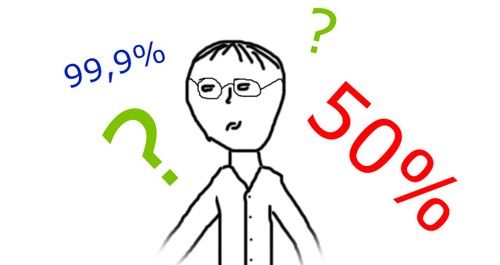Part 1 - Probability Theory is our EVERYTHING
So, we have more or less got acquainted with the probability in the previous article and have discovered that each event in the sport has its own chance, meanwhile even the bookmaker does not know the exact outcome.

And yet, the bookmaker can estimate the approximate likelihood, giving out then his quotations (coefficients). If we remove the margin, which shall be told later, the probability through the quotations of the bookmaker is expressed as a percentage in this way:
P = (1/k) * 100%, where k is the coefficient onto the event.
For example, the quotation for k = 2 corresponds to the probability of 50%. And coefficient 1.25 is in keeping with the probability of 80%. That is, an event will happen on average 8 times out of 10. However, thanks to the dispersion, (yes, the same, of which mention was made in the first part) this event can take place 15 times out of 15 at a small range. Or perhaps it will not happen four times in succession or even five times in a row. Although five times in succession is unlikely, but still may take place.
And let's count the probability of such an event (when coefficient 1.25 doesn't come five times in a row). It is calculated using the formula:
P = (1-1/k) ^ n * 100%, where k is the coefficient onto the event, n is the number of the losing bets in succession.

The likelihood of five consecutive losses of coefficient 1.25 equals = 0032% that by rounding is 1 time from 3000. But the probability with the dispersion are so sneaky that they do not guarantee you to slip 2999 times and to get exactly on 3000. They relinquish duties and leave it entirely to luck. This means that such a failure can happen for the first bets at once, and after 3000 bets, and more than once on the segment of 3000 bets.
In fact, from everything said above, it is already possible to draw very important, concrete and useful conclusions!

There are those who believe if you lose one stake, or even a few ones in a row, the probability of winning the next bet increases! Gamblers who think it is, begin with confidence to use forward financial strategies, such as the overtaking, they stake 50%-100% of the bank, playing a ladder, growing hoggets (multibets), well, and actually are engaged in all the bells and whistles of Swallows. The trick is, they catch the series of losses in practice that force goggling (instead of thinking), and they say, “The bad luck, it is not my lucky day, but right now a prize is definitely going to come” — and they start all over.
And yet, the truth is simple — the probability of winning the next bet does not depend at all on how many times in a row you have lost before. It is equal approximately to the likelihood that the bookmaker has given through its coefficients. Therefore, stop dabbling in a net overtaking, growing up hogs and playing a ladder, do something useful at the factory:)
P.s. The next part will be dedicated to the margin, the difference between the sports betting and the casino, perhaps to the dispersion and the statistical significance...
Comments